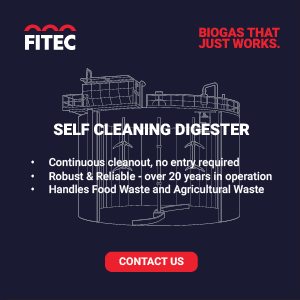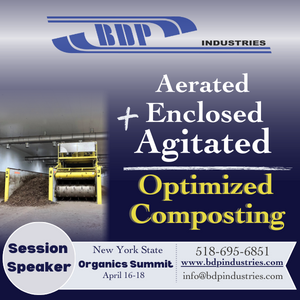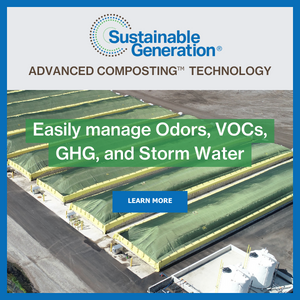
Sally Brown
BioCycle June 2012, Vol. 53, No. 6, p. 52
En route to a meeting and feeling a little bit overweight, I opted for the healthier lunch option, choosing Cobb Salad and orange juice over quesadilla and alcohol. Unfortunately, I soon needed to go in search of some real satisfying food. While I’m a failure in the realm of calories, I’ve lightened my load in other ways.
This started a few years back when my son copied all of my CDs onto an iPod. It really hadn’t occurred to me that the CDs took up a lot of space or that they were potentially cumbersome to listen to. Realize that I somewhere likely still have my copy of the Rolling Stones LP ‘Sticky Fingers’ with a real zipper on the album cover, so my perspective is questionable. The new iPod opened up a world of convenience and portability in addition to a whole area next to the couch. And now I find out that you don’t even need this — you can stream even more music on line through a range of services.
Just last week I confronted the file cabinets and bookcases in my office. I had been thinking that it really made no sense to keep some of those old journals or reprints when it was all available electronically, but I had no idea where to put the stuff I ended up deciding to clean out. The little recycling bin in my office would be enough for about one minute of concerted cleaning. As I was staring at the bin, overwhelmed by this monumental task, I noticed that the bin had a phone number and a website printed on it. I called and was pleased and amazed to find out that the University has a service for file cabinets like mine. You call; they come. Two toters, about the size of those food and yard waste bins, appeared in front of my door. I filled them up, went on line, clicked the appropriate box and the next day they were taken away, emptied and brought back for my final two loads.
Whole Picture
While I haven’t been able to cut down sufficiently on fat or calories, there is a range of opportunities to lighten our loads in other, very environmentally friendly ways. And this brings me to David Allaway’s presentation at the BioCycle West Coast Conference in April (available to view on line at www.biocycle.net). David works for the Oregon Department of Environmental Quality. At the conference he presented information on two different but related topics: materials management as a whole rather than just the waste management component, and using a full life cycle assessment (LCA) to understand the benefits and costs of compostable plastics.
His point with the materials management section was that although our industry focuses on disposal, the impact of changing disposal practices is minimal in comparison to the whole materials cycle. The complete story includes resource extraction, processing, product manufacture, distribution and finally consumption. So for my office, this started with cutting down the tree, pulping the fiber, making it into the paper, then printing the original journals and using the copy machine and more paper to get me the reprints. My growing dependence on PDFs has taken that whole process and left it with many trees standing.
David’s second point was that biodegradable plastics, if considered using a full LCA perspective, are actually less of a fabulous thing than you would think if all you considered was the image of the plastic washing up on the otherwise virgin beach. His analysis showed that recycled plastic had a higher ecotoxicity potential than either composted or traditional plastic. This was reversed when other environmental indicators were considered with recycled materials coming in as the best option. With the greenhouse gas lens, the upstream or manufacturing impacts of each type of plastic were similar, with recycled plastic edging out the others because of lower impact at the tail end of life. During his talk, David pointed out that from many angles, sequestering plastic in a landfill might be preferable to letting it decompose and release CO2. This is a drastic oversimplification of his talk and analysis, details of which can be found here: http://www.deq.state.or.us/lq/sw/materialsmgmtplanbkgrdocs.htm.
The Behavior Factor
The one item the analysis did not consider and that relates back to cleaning out my office was the social behavior component of compostable plastics. This is now often done as an extension of an LCA and is part of a triple bottom line analysis. How people think and behave adds another, essential component to these types of analyses. For example, even if composting is by far the best option via life cycle assessment, if people are unwilling to put their food scraps into the appropriate bin, having the bin will not get you too far.
Changing behavior patterns and opinions is a critical component of actually applying conclusions reached using the LCA tool. I have a cleaner and reduced paper office because the University of Washington recycling office made it so easy for me to recycle that paper. At the BioCycle conference, you saw examples and samples (I did help myself here) of a particular type of compostable plastic that really drives this point home: compostable garbage bags. Some day I will buy compostable garbage bags. For the moment though, I am thoroughly enjoying using my samples for the food waste bin in my house. I can take the whole plastic bag, tie it into a neat knot and deposit the whole thing into the compost bin. No muss, no fuss and a higher participation rate. That higher participation rate for food scraps collection was not something that was considered in the LCA results that David presented. For me, that can be a game changer.
The point of this column is two fold. I agree with David Allaway that a holistic perspective is critical; waste management is not a sufficient lens. I also agree that life cycle assessment is a critical evaluation tool in an attempt to fully appreciate the ramification of different materials management options. The aspects that David did not address are how rapidly our society is changing and how encouraging these changes can be an instrumental part in wide scale adoption of new behavior. In many aspects, we are coming into an age of less stuff. Less stuff in the areas I touched on earlier in the column currently make up a significant component of the solid waste stream.
Some of these changes don’t bode well for our industry as it is currently defined. No paper and reduced plastics mean fewer residuals to fight over. Rather than fighting for these scraps, I think a portion of the industry will need to redefine itself. That is okay. Quality of life in many cases is coming to be understood as meaning more than just acquiring more stuff. For example, exposure to nature and natural processes is becoming recognized for a wide range of benefits including improved physical and mental health.
For those that remain in residuals management, there will always be food scraps and biosolids. However many people convert to PDFs, I have a feeling that not so many will be as successful switching to the Cobb salad. And even if they do, there will still be biosolids and wilted lettuce.
Sally Brown — Research Associate Professor at the University of Washington in Seattle — authors this regular column. Email Dr. Brown at slb@u.washington.edu.










